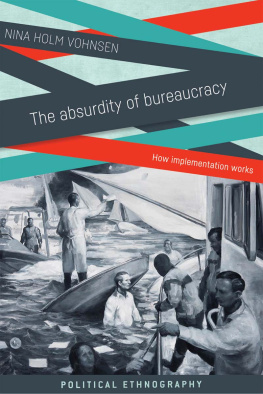Copyright Nina Holm Vohnsen 2017
The right of Nina Holm Vohnsen to be identified as the author of this work has been asserted by her in accordance with the Copyright, Designs and Patents Act 1988.
Published by Manchester University Press
Altrincham Street, Manchester M1 7JA
www.manchesteruniversitypress.co.uk
British Library Cataloguing-in-Publication Data
A catalogue record for this book is available from the British Library
ISBN 978 1 5261 0134 1 hardback
First published 2017
The publisher has no responsibility for the persistence or accuracy of URLs for any external or third-party internet websites referred to in this book, and does not guarantee that any content on such websites is, or will remain, accurate or appropriate.
Typeset in Minion by
Servis Filmsetting Ltd, Stockport, Cheshire
To the public sector with love and affection
We cannot live human lives without energy and attention, nor without making choices which show that we take some things more seriously than others. Yet we have always available a point of view outside the particular form of our lives, from which the seriousness appears gratuitous. These two inescapable viewpoints collide in us, and that is what makes life absurd. (Thomas Nagel : 719)
Ethnography reaches the parts of politics that other methods cannot reach. It captures the lived experience of politics; the everyday life of political elites and street-level bureaucrats. It identifies what we fail to learn, and what we fail to understand, from other approaches. Specifically:
1. It is a source of data not available elsewhere.
2. It is often the only way to identify key individuals and core processes.
3. It identifies voices all too often ignored.
4. By disaggregating organisations, it leads to an understanding of the black box, or the internal processes of groups and organisations.
5. It recovers the beliefs and practices of actors.
6. It gets below and behind the surface of official accounts by providing texture, depth and nuance, so our stories have richness as well as context.
7. It lets interviewees explain the meaning of their actions, providing an authenticity that can only come from the main characters involved in the story.
8. It allows us to frame (and reframe, and reframe) research questions in a way that recognises our understandings about how things work around here evolve during the fieldwork.
9. It admits of surprises of moments of epiphany, serendipity and happenstance that can open new research agendas.
10. It helps us to see and analyse the symbolic, performative aspects of political action.
Despite this distinct and distinctive contribution, ethnographys potential is rarely realised in political science and related disciplines. It is considered an endangered species or at best a minority sport. This series seeks to promote the use of ethnography in political science, public administration and public policy.
The series has two key aims:
1. To establish an outlet for ethnographic research into politics, public administration and public policy.
2. To build an interdisciplinary platform for a readership interested in qualitative research into politics and administration. We expect such work to cut across the traditional scholarly boundaries of political science, public administration, anthropology, organisation studies, social policy, and development studies.
The first book in the series is The absurdity of bureaucracy: How implementation works, by Nina Holm Vohnsen of the Department of Anthropology, Aarhus University, Denmark. She offers a humorous and sobering account of policy implementation set in contemporary Danish bureaucracy. Taking the reader deep into the hallways of governmental administration and municipal caseworkers offices, the book explores labour market policy. The randomised controlled trial known as Active Back Sooner was a central component of the Danish Governments Action Plan on Sickness Benefit. It sought to reduce the cost of sickness benefit and to secure an active labour force. Using the notions of absurdity and sense-making as lenses through which to explore the dynamic relationship between a policy and its effects, the book reclaims implementation studies for the qualitative sciences. It emphasises the existential dilemma confronting any policymaker and public official; namely, whatever you do, you will regret you did not do the opposite as well. Following step-by-step the planning and implementation of the policy, the book sets out to show that going wrong is not a question of implementation failure but is the only way in which implementation can happen.
The book develops a novel theory of policy implementation that incorporates the absurd and the incoherent in implementation. Its findings will intrigue all students of public administration and public policy. However, much as I admire the fieldwork, I was first drawn to this book by its innovative writing. As a political science professor, I was trained in a professional way of writing that discourages experimentation and encourages many clumsy neologisms. This book opens with a montage of ethnographic snapshots. Each is 1015 lines long and might be a conversation, a dilemma, a scene from a bureaucratic setting, a decision taken or a situation confronted. They serve to introduce the reader to the books analytical heart; the dilemma between sensible decisions and the resulting experience of absurdity. The montage makes use of two writing techniques: American novelist Kurt Vonneguts abandonment of the beginning, middle and end in narratives, and Russian film-maker Sergei Eisensteins intellectual montage. I had never read such a bold at first I thought rash way of starting a book. But it works. Such self-aware experimentation with the craft of writing is an example not only to my political science colleagues but to everyone who seeks to contribute to the series.
Professor R. A. W. Rhodes
University of Southampton
Series editor













